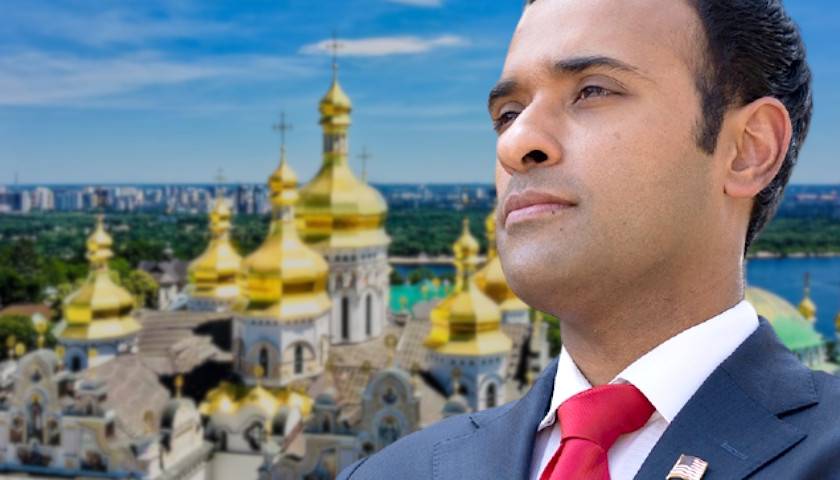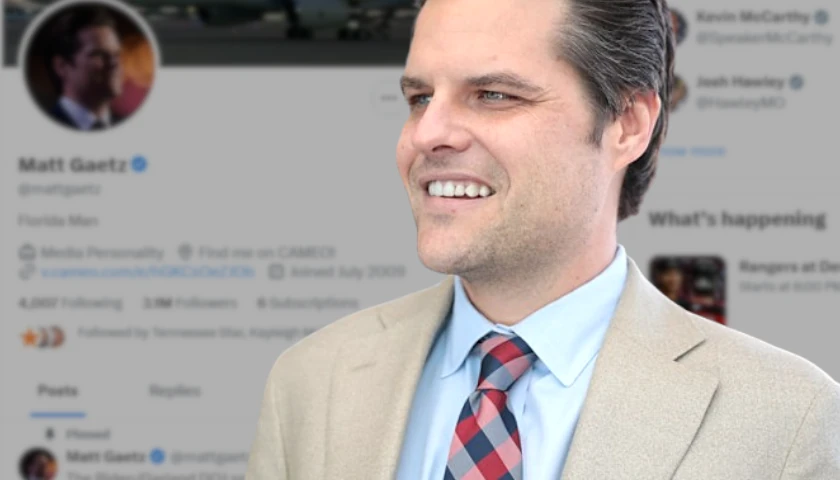Speaking at a campaign event Friday in New Hampshire, Ohio businessman and GOP presidential candidate Vivek Ramaswamy laid out his plan for peace in Ukraine by opening up Russia.
The 37-year-old political outsider, who has often said political leaders need to “think on the timescales of history, not on two-year election cycles,” believes a Nixon approach to Russia would curtail the looming threat of communist China.
“I will end the war by ceasing further U.S. support for Ukraine and negotiating a peace treaty with Russia that achieves a vital U.S. security objective: ceasing Russia’s growing military alliance with China,” the 37-year-old political outsider said. “This strategy is the mirror-image of President Nixon’s diplomatic maneuver that distanced China from Russia in 1972, except this time Putin is the new Mao.”
Now into its second year, Russia’s bloody invasion of Ukraine has been a costly affair — in the toll of its hundreds of thousands of casualties and the economic price tag. U.S. taxpayers already are on the hook for well north of $75 billion in assistance to Ukraine, according to the German-based Kiel Institute for the World Economy. The expenditures include humanitarian, financial, and military aid.
Ramaswamy pointed to former President Donald Trump’s claims that he would end Russia’s war in Ukraine in 24 hours, “but refuses to say how.” He said Florida Governor Ron Desantis’ position is unclear, and others in the chase for the Republican Party nomination back continued U.S. involvement in Ukraine. Ramaswamy doesn’t.
Ramaswamy asserts the U.S. can broker a peace deal while helping to sever the strategic military ties between Russia and China.
“The Sino-Russia alliance presents the greatest military risk the U.S. has ever faced. Russia and China together outmatch the U.S. in every area of great power competition: geographic footprint, economic potential, industrial manufacturing might, conventional military power, and nuclear weapons, including super-Electromagnetic Pulse (EMP) weapons, which could destroy critical U.S. infrastructure resulting in hundreds of millions of American civilian casualties,” he said.
Ramaswamy asserts President Joe Biden’s ongoing support for Ukraine is “pushing Russia into a closer military alliance with China which increases the risk of nuclear war.”
The bio-tech entrepreneur would offer what he describes as a Korean war style armistice agreement that codifies the current lines of control, ceding most of the Donbas region to Russia.
“The agreement would suspend any further U.S. military assistance to Ukraine and a permanent moratorium on Ukraine joining NATO,” he said. “Further, the U.S. and western NATO countries would end the Western sanctions regime against Russia, restore normal diplomatic relations with Russia with mutual security commitments, withdraw all troops from Ukraine, and close all their bases in Eastern Europe — returning to the reality that existed before the July 2016 Warsaw Summit.”
What would Vladimir Putin’s Russia give the United States in return?
Russia would completely exit its military alliance with China, ending the 2001 Treaty of Good-Neighborliness and Friendly Cooperation and the 2022 no-limits partnership, Ramaswamy proposes.
“Russia would permanently suspend all military-technical cooperation and joint military exercises with China. Russia would agree to re-enter the pre-2023 New Start nuclear non-proliferation treaty with the U.S. that Russia abandoned earlier this year in the context of the Ukraine War,” the presidential candidate said. “In addition, Russia would withdraw all nuclear weapons and delivery capabilities from Belarus, Kaliningrad, and all Russian-annexed regions of Ukraine, as well as all military forces from Cuba, Venezuela, and Nicaragua – effectively eliminating Russia’s nuclear threat to the U.S. and Europe.”
Russia has adamantly opposed Ukraine’s admission into NATO, with a Russian Security Council official saying it would guarantee the escalation of World War III.
Ramaswamy said the U.S. would continue its security commitment to NATO while accepting Russia into the”security infrastructure of Europe, reducing future catalysts that Russia could use as pretexts to invade its neighbors.”
“This strategy trades the current bilateral international order which strongly favors China for a new trilateral international order in which none of the three nuclear superpowers are allied together, liberating the U.S. and its allies to focus on deterring Chinese aggression,” Ramaswamy said.
He added that the U.S. should “pre-specify” that if Putin reneges and reinstates its military cooperation with China, the U.S. will immediately support admitting Ukraine into NATO and re-impose all economic sanctions against Russia.
“This would leave Russia in an even weaker position than prior to the Ukraine War. Putin will also have less reason to renege because he would be less dependent on China if the West restores economic relations with Russia,” Ramaswamy said.
Former Vice President Mike Pence, who is expected to enter the presidential race next week, has been a staunch supporter of U.S. support of Ukraine. In February, Pence called for more and faster military aid to the war-torn country.
“Make no mistake: This is not America’s war. But if we falter in our commitment to providing the support to the people of Ukraine to defend their freedom, our sons and daughters may soon be called upon to defend ours,” Pence said. “If we surrender to the siren song of those in this country who argue that America has no interest in freedom’s cause, history teaches we may soon send our own into harm’s way to defend our freedom and the freedom of nations in our alliance.”
Ramaswamy said Russia’s apparent willingness last year to negotiate a peace agreement addressing its security concerns “suggest that [Putin] is open to a deal and provides the U.S. with negotiating leverage to bring him back to the table.”
“With China’s growing military support of Russia in the war, Ukraine will not defeat Russia militarily in absence of extraordinary U.S. intervention. Such intervention would badly deplete U.S. military resources needed for land conflict in Taiwan which may itself be China’s objective in backing Russia,” Ramaswamy said. “Under my peace plan, Ukraine will still emerge with its sovereignty intact and Russia permanently diminished as a foe. Ukraine’s best path to preserving its own security is to accept a U.S.-negotiated agreement backstopped by Russian commitments to the U.S.”
“Opponents of U.S. engagement in Ukraine should embrace the possibility that we can accomplish more than just saving money by ending the war,” the presidential candidate added. “We can also achieve the most vital U.S. security objective of the 21st century: deterring Chinese aggression. If elected, I will lead accordingly.”
– – –
M.D. Kittle is the National Political Editor for The Star News Network.
Photo “Vivek Ramaswamy” by Vivek Ramaswamy.





